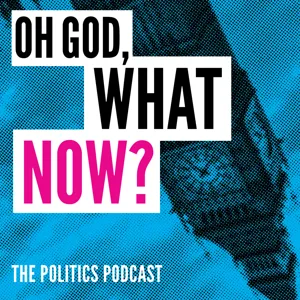AI Doesn't Have to Automate Away All the Jobs

Explore "policymaking" with insightful episodes like "AI Doesn't Have to Automate Away All the Jobs", "How To Win At Policy", "AI Leaders Call for International Panel on AI Safety", "Redaction Man" and "Is Westminster broken?" from podcasts like ""The AI Breakdown: Daily Artificial Intelligence News and Discussions", "How To Win An Election", "The AI Breakdown: Daily Artificial Intelligence News and Discussions", "Oh God, What Now?" and "The New Statesman Podcast"" and more!


As the government sets out its plans in the King's Speech, we ask whether policies can win or lose an election.
Peter Mandelson regrets backing HS2 to upstage the Tories, Polly Mackenzie thinks the pension triple lock was a terrible idea, while Daniel Finkelstein remembers the time his peer's robes were mistaken for a Father Christmas outfit.
And is Suella Braverman a born disruptor?
Send questions, comments and voicenotes to: howtowin@thetimes.co.uk
Clip: Harry Secombe, Peter Sellers, Spike Milligan – How To Win An Election, written by Leslie Bricusse, Philips Recordings
Hosted on Acast. See acast.com/privacy for more information.



Harry Lambert, New Statesman contributing writer, joins Anoosh Chakelian to discuss what could work better in political journalism, the way Westminster and Whitehall are structured, and local government – inspired by two new books, Ian Dunt’s How Westminster Works...and Why It Doesn’t and Paul Johnson’s Follow the Money, on the subject.
Hosted on Acast. See acast.com/privacy for more information.

The MP for South West Norfolk has made a speech in Taiwan urging the UK Government to treat China as a security threat.
She's the first former PM to visit Taiwan since Margaret Thatcher.
China - which is seeking 'reunification' with Taiwain - has called it a 'dangerous stunt'. Many in Truss's own party feel the same way.
But is there sense in her message even if she's the wrong one to deliver it? And what is she hoping to achieve - for the world, her party and herself?
And, later, we speak to Oscar-winning actress Rachel Weisz about playing twins in her drama 'Dead Ringers', moves to curtail women's rights in the US, her husband James Bond, and Lewis' acorn.



Do you ever stop to wonder if the way you see the world is how the world really is? Economist Abhijit Banerjee has spent a lifetime asking himself this question. His answer: Our world views often don't reflect reality. The only way to get more accurate is to think like a scientist — even when you're not looking through a microscope.
If you like this show, please check out our new podcast, My Unsung Hero! And if you’d like to support our work, you can do so at support.hiddenbrain.org.


Many of us are brimming with good intentions right now, determined to eat more healthily, get organized or fulfill our other New Year’s resolutions. But by February we’ll have reverted back to our old ways. Why is it so difficult to make these lasting behavioral changes? Wendy Wood, PhD, of the University of Southern California, discusses the research on how habits drive our behavior, why habits are so difficult to break, and how we can harness the power of habit to make the behavioral changes we want.
We’d love to know what you think of Speaking of Psychology, what you would change about it, and what you’d like to hear more of. Please take our listener www.apa.org/podcast survey.
Links
Wendy Wood, PhD
Music
Jazz Music Loop by anechoix via freesound.org


The Senate unanimously passes a massive government spending plan, Democrats seek even more money, and coronavirus begins to hit New York City hospitals.
Check out The Cold War: What We Saw, a new podcast written and presented by Bill Whittle at https://www.dailywire.com/coldwar. In Part 1 we peel back the layers of mystery cloaking the Terror state run by the Kremlin, and watch as America takes its first small steps onto the stage of world leadership.
If you like The Ben Shapiro Show, become a member TODAY with promo code: SHAPIRO and enjoy the exclusive benefits for 10% off at https://www.dailywire.com/Shapiro
Learn more about your ad choices. Visit podcastchoices.com/adchoices



He's been U.S. Treasury Secretary, a chief economist for the Obama White House and the World Bank, and president of Harvard. He's one of the most brilliant economists of his generation (and perhaps the most irascible). And he thinks the Trump Administration is wrong on just about everything.

Stay up to date
For any inquiries, please email us at hello@podcastworld.io